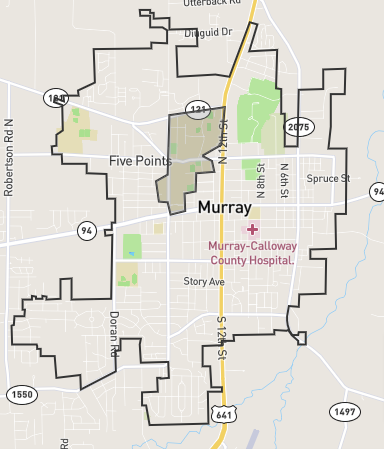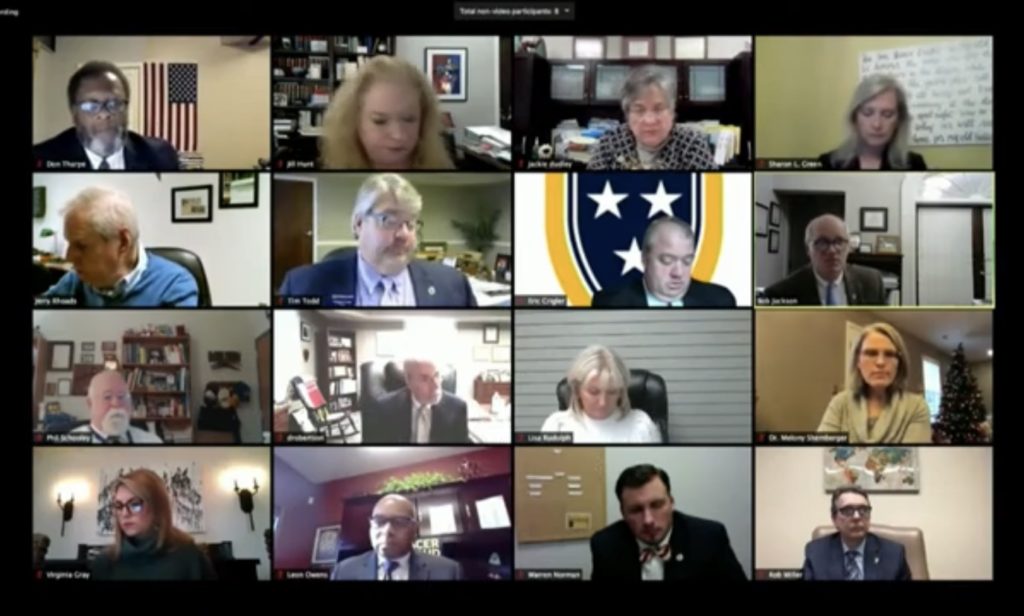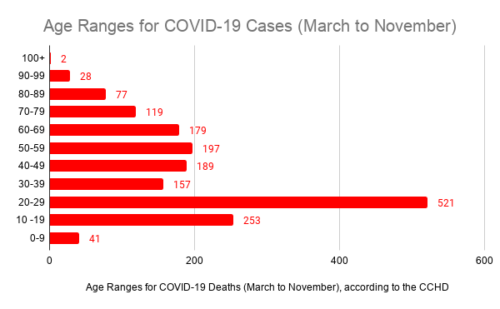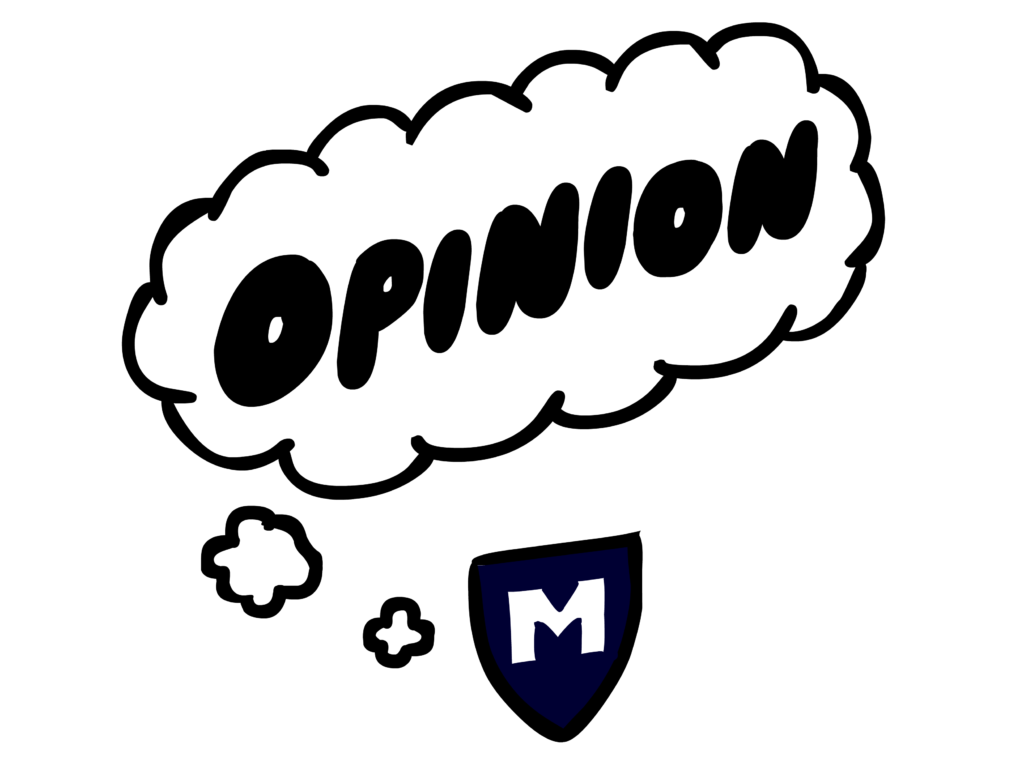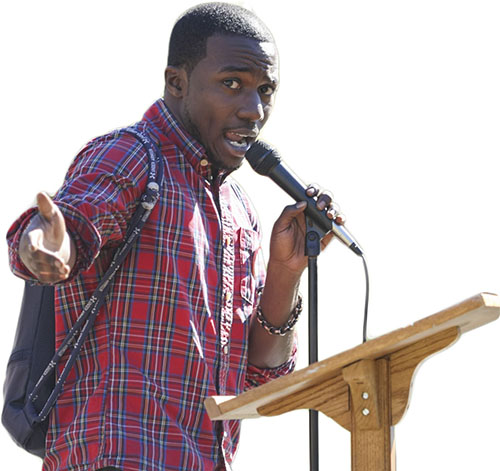
(WITH VIDEO) – On the Carr Health Building lawn, students, faculty and staff gathered, urging the community to speak publicly about racism on campus and change what has become a pattern of intolerance.
Beginning at 10 a.m., the “Eracism” teach-in was created to bring all members of Murray State together through a full day of speeches and conversation, and ended with a panel discussion titled, “Race and Courage in the Age of Yik Yak.”
FACULTY AND STAFF ON RACISM
Co-hosts and professors Peter Murphy and Mary-Tripp Reed, who were two of eight faculty, started the event that was created along with several students.
The first speech was the reading of a letter from President Bob Davies by Senior Presidential Adviser Renee Fister.
In the letter, Davies said Murray State is a “marketplace of ideas,” that depends on open thought and new paradigms.
“As part of this openness to new ideas and thoughts, we must further embrace our commitment to a diverse university community,” Davies said. “This includes not only a diverse population of students, faculty and staff based on gender, race, religion, color and creed; but also includes the sexual orientation of our members as well political thought, socioeconomic status and many other dimensions of diversity.”
Following Davies’ letter, Don Robertson, vice president of Student Affairs and chair of the President’s Commission on Diversity Inclusion, spoke. Robertson said Murray State should be safe for students to express their individuality and uniqueness – a part of the Student Affairs mission statement.
“As such, racism and bigotry has no place in this mission and certainly has no place in our campus community,” Robertson said.
Other speakers included:
• Assistant professor of Humanities and Fine Arts, Carrie Jerrell
• Assistant professor of Humanities and Fine Arts, Drew Seib
• Assistant professor of Humanities and Fine Arts, Brian Clardy
• Coordinator of Humanities and Fine Arts, Peter Murphy
• Associate professor of Humanities and Fine Arts, Lissa Graham
• Professor of Humanities and Fine Arts, Sarah Gutwirth
• LGBT Program Coordinator Jody Cofer Randall
• Vising Professor in Residence of Humanities and Fine Arts, Riley Hanick
• Lecturer, Mary-Tripp Reed
• Assistant professor of Humanities and Fine Arts, Joshua Adair
Deidre Redmond, associate professor of Humanities and Fine Arts, said having this conversation on campus is important because racist incidents have taken place at Murray State and people seem to be unaware.
In the age of technology, students use social media to be discreet about their opinions. Redmond said last year, students fled to Twitter to post racist comments to @MSUAsians and @MSUBlackPeople, among others.
This year students are using a new app, Yik Yak, to publicize their racist opinions.
Redmond said for Murray State to have any progress, people have to talk about racism openly and in a way that embraces the need to move forward.
Redmond said when she spoke to her students about the racist acts occurring on campus, they had no idea it was happening.
“My students didn’t know what was happening approximately one minute away from my classroom,” Redmond said.
She decided to be involved with Eracism to model for her students how important it is to have this discussion.
“I wanted to make sure that I was there to show students that it is something I take seriously and that I am actually going to be about it,” she said.
STUDENTS ON RACISM
Kali Speaks, senior from Owensboro, Ky., said her job as master of ceremonies at the poetry reading was to moderate and ensure a safe speaking environment for participants.
“I asked several friends to come forward today and tell their stories, but they said they were too scared to,” she said.
In her own testimony, Speaks told listeners about a time she was accused of planning a robbery at a Benton, Ky., Arby’s because other diners thought she looked guilty due to her appearance.
“I had been told not to go to Benton after 6 p.m.,” she said.
Speaks said the Trayvon Martin case resonated with her more because she was wearing a hoodie while she was in Benton that night.
Martin was a black teenager shot and killed by neighborhood watchman George Zimmerman in 2012. Zimmerman was aquitted in 2013.
Ariel Mitchell, junior from Louisville, Ky., said microaggressions, or daily racially based indignities, are proof that racism is internalized.
“We have to unteach these things that we have been told,” she said.
Mitchell said immediately pointing out bigotry on a daily basis is a way to combat subtle racism.
Tracie Gilbert, the minority 2014-15 faculty fellow, said she was at Murray State to help develop cultural diversity. In those efforts she has brought together a new group on campus, the Diversity Education Squad. The group has five active members.
Gilbert said the Eracism event was conceived in response to Yik Yak comments made in regard to the rally Murray State students held in front of Waterfield Library.
She said the event allowed her to analyze shootings, like one of black teenager Michael Brown.
“I felt the need to explain the ramifications of what happened to Michael Brown,” Gilbert said.
Story by Mari-Alice Jasper, Staff writer and Mary Bradley, Editor-in-Chief
Video produced by Josiah Brand





























































































